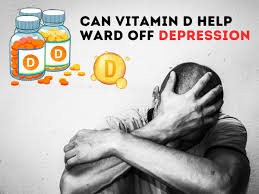
Is a Vitamin D Deficiency Causing Your Depression? Exploring the Link between Sunshine and Mental Health
January 24, 2025
Depression is a multifaceted condition influenced by genetics, environment, lifestyle, and biology. While traditional treatments like therapy and antidepressants remain cornerstones of care, researchers are increasingly examining the role of nutrients—particularly vitamin D—in mental health. Often dubbed the “sunshine vitamin,” vitamin D is essential for physical and cognitive well-being. But could a deficiency in this critical nutrient be contributing to your low mood? This article explores the science behind vitamin D and depression, offering insights into symptoms, testing, and solutions.
1. What Is Vitamin D, and Why Does It Matter?
Vitamin D is a fat-soluble nutrient that functions like a hormone in the body. It’s primarily synthesized when sunlight hits the skin, though it can also be obtained through diet and supplements. Key roles of vitamin D include:
- Regulating calcium absorption for bone health.
- Supporting immune function.
- Influencing neurotransmitter production (e.g., serotonin, dopamine).
- Reducing inflammation.
An estimated 1 billion people worldwide are deficient in vitamin D, with higher rates in regions with limited sunlight, darker-skinned populations, and those with poor dietary intake.
2. The Vitamin D-Depression Connection: What Does the Science Say?
Research suggests a bidirectional relationship between vitamin D and mental health:
A. Vitamin D’s Role in Brain Function
Neurotransmitter Synthesis: Vitamin D receptors are found in brain regions linked to mood regulation, such as the hippocampus. The vitamin aids in converting tryptophan to serotonin, a neurotransmitter often low in people with depression.
- Neuroprotection: It promotes neuronal growth and reduces inflammation, which is linked to depressive disorders.
- Hormonal Balance: Vitamin D helps regulate cortisol (the stress hormone), potentially mitigating anxiety and mood swings.
B. Observational Studies
Multiple studies correlate low vitamin D levels with higher depression risk:
A 2013 meta-analysis in the British Journal of Psychiatry found that individuals with depression had 14% lower vitamin D levels than non-depressed peers.
A 2020 study in Nutrients noted that vitamin D deficiency was twice as common in people with major depressive disorder (MDD).
C. Conflicting Evidence
However, not all studies confirm causation:
- Some randomized controlled trials (RCTs) show minimal improvement in depression symptoms after vitamin D supplementation.
- Critics argue that deficiencies may be a consequence of depression (e.g., reduced outdoor activity) rather than a cause.
- While the link isn’t definitive, maintaining adequate vitamin D levels is a low-risk strategy that may complement traditional treatments.
3. Symptoms of Vitamin D Deficiency
Vitamin D deficiency often presents subtly. Physical and mental symptoms include:
- Physical: Fatigue, muscle weakness, bone pain, frequent infections.
- Mental: Low mood, irritability, brain fog, anxiety, sleep disturbances.
- These symptoms overlap with depression, making it easy to overlook a deficiency.
4. Whose at Risk for Vitamin D Deficiency?
Certain groups are more vulnerable:
- Limited Sun Exposure: Office workers, homebound individuals, or those in northern latitudes.
- Darker Skin Tones: Melanin reduces the skin’s ability to synthesize vitamin D.
- Older Adults: Aging skin produces less vitamin D, and dietary intake may decline.
- Chronic Illnesses: Obesity, Crohn’s disease, or kidney disorders impair absorption.
- Strict Diets: Vegans or those avoiding fortified foods (e.g., dairy, fish).
5. How to Test for Vitamin D Deficiency
A simple blood test—25-hydroxy vitamin D test—measures levels:
- Normal: 30–100 ng/mL
- Insufficient: 20–29 ng/mL
- Deficient: <20 ng/mL
The Endocrine Society recommends maintaining levels above 30 ng/mL for optimal health.
6. Can Boosting Vitamin D Improve Depression?
While vitamin D isn’t a cure-all, addressing a deficiency may alleviate symptoms in some individuals:
A. Supplementation Studies
- A 2014 RCT in Journal of Internal Medicine found that high-dose vitamin D supplementation improved depressive symptoms in deficient individuals.
- A 2020 review in Depression and Anxiety concluded that supplementation had modest benefits, particularly in those with severe deficiencies.
B. Combined Approaches
Pairing vitamin D with other treatments (e.g., SSRIs, therapy) may enhance outcomes. For example, a 2018 study in Nutritional Neuroscience reported better results when vitamin D was added to antidepressant regimens.
7. How to Increase Vitamin D Levels
A. Sunlight
Aim for 10–30 minutes of midday sun exposure 3–4 times weekly (varies by skin tone and location).
B. Diet
- Fatty Fish: Salmon, mackerel, sardines.
- Fortified Foods: Milk, cereals, plant-based milks.
- Egg Yolks and Mushrooms: Smaller but valuable sources.
C. Supplements
- Vitamin D3 (Cholecalciferol): More effective at raising levels than D2.
- Dosage: 600–800 IU/day for adults, though deficient individuals may need 1,000–5,000 IU under medical supervision.
- Note: Excessive vitamin D can cause toxicity (nausea, kidney issues). Always consult a doctor before starting supplements.
8. When to Seek Help for Depression
While optimizing vitamin D is beneficial, depression often requires comprehensive care. Seek professional help if:
- Symptoms persist for >2 weeks.
- Daily functioning is impaired.
- You experience suicidal thoughts.
Therapies like CBT, antidepressants, or lifestyle changes (exercise, sleep hygiene) are critical components of treatment.
9. Debunking Myths
- Myth: “More vitamin D will cure my depression.”
Reality: It may help in cases of deficiency but isn’t a standalone solution. - Myth: “I get enough sun, so I’m not deficient.”
Reality: Factors like sunscreen use, pollution, and skin tone affect synthesis.
Conclusion
The relationship between vitamin D and depression is complex and individualized. While deficiency isn’t the sole cause of depression, it may exacerbate symptoms or hinder recovery. Testing your levels and addressing gaps—through sunlight, diet, or supplements—could be a valuable step in your mental health journey.
However, vitamin D is not a magic bullet. Combine nutritional strategies with professional mental health support for holistic well-being. If you’re struggling, reach out to a healthcare provider to explore all avenues of care.
Remember, even small steps—like a walk in the sun or a balanced meal—can brighten your mood and your health.













